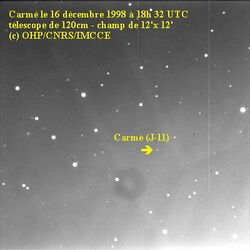Astronomy:Carme (moon)
 Carme photographed by the Haute-Provence Observatory in December 1998 | |
| Discovery [1] | |
|---|---|
| Discovered by | Seth B. Nicholson |
| Discovery site | Mt. Wilson Observatory |
| Discovery date | 30 July 1938 |
| Designations | |
Designation | Jupiter XI |
| Pronunciation | /ˈkɑːrmiː/[2][3] |
| Named after | Κάρμη Karmē |
| Adjectives | Carmean /kɑːrˈmiːən/[4] |
| Orbital characteristics[5] | |
| Epoch 17 December 2020 (JD 2459200.5) | |
| Observation arc | 82.02 yr (29,958 days) |
| 0.1509370 astronomical unit|AU (22,579,850 km) | |
| Eccentricity | 0.2294925 |
| Orbital period | –693.17 d |
| Mean anomaly | 17.48241° |
| Mean motion | 0° 31m 9.68s / day |
| Inclination | 163.53496° (to ecliptic) |
| Longitude of ascending node | 209.94088° |
| 133.45035° | |
| Satellite of | Jupiter |
| Group | Carme group |
| Physical characteristics | |
| Mean diameter | 46.7±0.9 km[6] |
| Rotation period | 10.40±0.05 h[7] |
| Albedo | 0.035±0.006[6] |
Spectral type | D[6] |
| Apparent magnitude | 18.9[8] |
| Absolute magnitude (H) | 10.5[5] |
Carme /ˈkɑːrmiː/ is a retrograde irregular satellite of Jupiter. It was discovered by Seth Barnes Nicholson at Mount Wilson Observatory in California in July 1938.[1] It is named after the mythological Carme, mother by Zeus of Britomartis, a Cretan goddess.
History

Carme did not receive its present name until 1975;[9] before then, it was simply known as Jupiter XI. It was sometimes called "Pan"[10] between 1955 and 1975 (Pan is now the name of a satellite of Saturn).
It gives its name to the Carme group, made up of irregular retrograde moons orbiting Jupiter at a distance ranging between 23 and 24 Gm and at an inclination of about 165°. Its orbital elements are as of January 2000.[11] They are continuously changing due to solar and planetary perturbations.
Properties
With a diameter of 46.7±0.9 km, it is the largest member of the Carme group and the fourth largest irregular moon of Jupiter.[6] It is light red in color (B−V=0.76, V−R=0.47), similar to D-type asteroids and consistent with Taygete, but not Kalyke.[12]
See also
- Irregular satellites
- Jupiter's moons in fiction
References
- ↑ 1.0 1.1 Nicholson, S. B. (1938). "Two New Satellites of Jupiter". Publications of the Astronomical Society of the Pacific 50 (297): 292–293. doi:10.1086/124963. Bibcode: 1938PASP...50..292N. http://adsabs.harvard.edu//full/seri/PASP./0050//0000292.000.html.
- ↑ Noah Webster (1884) A Practical Dictionary of the English Language
- ↑ "Carme". Dictionary.com Unabridged. Random House. https://www.dictionary.com/browse/Carme.
- ↑ Yenne (1987) The Atlas of the Solar System
- ↑ 5.0 5.1 "M.P.C. 127087". Minor Planet Circular. Minor Planet Center. 17 November 2019. https://minorplanetcenter.net/iau/ECS/MPCArchive/2020/MPC_20201117.pdf.
- ↑ 6.0 6.1 6.2 6.3 Grav, T.Expression error: Unrecognized word "etal". (August 2015). "NEOWISE: Observations of the Irregular Satellites of Jupiter and Saturn". The Astrophysical Journal 809 (1): 9. doi:10.1088/0004-637X/809/1/3. 3. Bibcode: 2015ApJ...809....3G. https://authors.library.caltech.edu/61254/1/Grav_2015.pdf.
- ↑ Luu, Jane (September 1991). "CCD photometry and spectroscopy of the outer Jovian satellites". Astronomical Journal 102: 1213–1225. doi:10.1086/115949. ISSN 0004-6256. Bibcode: 1991AJ....102.1213L.
- ↑ Sheppard, Scott. "Scott S. Sheppard - Jupiter Moons". Department of Terrestrial Magnetism. Carnegie Institution for Science. https://sites.google.com/carnegiescience.edu/sheppard/moons/jupitermoons.
- ↑ IAUC 2846: Satellites of Jupiter 1974 October 7 (naming the moon)
- ↑ Payne-Gaposchkin, Cecilia; Katherine Haramundanis (1970). Introduction to Astronomy. Englewood Cliffs, N.J.: Prentice-Hall. ISBN 0-13-478107-4.
- ↑ Jacobson, R. A. (2000). "The Orbits of Outer Jovian Satellites". Astronomical Journal 120 (5): 2679–2686. doi:10.1086/316817. Bibcode: 2000AJ....120.2679J. https://trs.jpl.nasa.gov/bitstream/2014/15175/1/00-1187.pdf.
- ↑ Grav, Tommy; Holman, M. J.; Gladman, B. J.; Aksnes, K. (2003). "Photometric survey of the irregular satellites". Icarus 166 (1): 33–45. doi:10.1016/j.icarus.2003.07.005. Bibcode: 2003Icar..166...33G.
External links
- Carme Profile by NASA's Solar System Exploration
- David Jewitt pages
- Jupiter's Known Satellites (by Scott S. Sheppard)
 |
